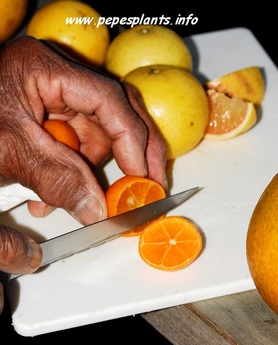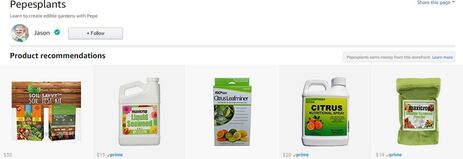Citrus trees have been a symbol for healthy living under the sun.
Ahhh.... fresh squeezed sunshine!
Today, more and more people and especially Floridians, are seeking to plant citrus trees.
The subject of citrus trees is quite an emotional one for many Floridians. Many of us witnessed the destruction of trees from our property years ago in an effort by the State to halt the spread of citrus canker. Well today more serious diseases threaten and things have escalated in the battle to save the citrus industry.
The good news is that growing healthy citrus trees is not impossible. With a little effort and vigilance we can all enjoy our home grown citrus again!
Let's begin by looking at the challenges and some of the solutions.
Enemy #1
The Asian Citrus Psyllid is a serious threat to the Citrus industry. This insect spreads a very dangerous disease. Florida and possibly the entire citrus industry of the United States is at risk of destruction from the disease Huanglongbing.
(aka: HLB or Citrus Greening)
To fight the battle on the ACP and protect citrus trees, regulatory agencies devised control measures. Inspections, quarantines and pesticides as the required strategies. Florida nurseries growing and selling citrus trees must monitor and protect the trees. Trees must have tags to indicate treatments and the program is heavily regulated. Commercial citrus growers must also apply the pesticides by aerial application or by injection.
California and Texas are desperately fighting to keep the Asian Citrus Psyllid away. Some ACP have already arrived in Texas and California but not taken a foot hold. The battle continues and conventional pesticides seem to be leading the effort.
*Things are so serious in the industry that even the use of antibiotics is being considered. Hope however is on the horizon. Research is ongoing on the development of pheromones to stop ACP from infecting citrus trees.
Another strategy to keep citrus trees healthy is micronutrient treatments. See the ones we offer below.
Evidence of effective disease control has been found from Citrus growers in Vietnam. The growers plant guava trees and one year later plant citrus about 6 feet apart from the guava trees. This method appears to control Asian Citrus Psyllids and prevents the spread of citrus greening. Here is the link to the PDF File.
This inter planting is an example of what Permaculture is all about! The USDA is conducting inter planting in Fort Pierce Florida and the research is on going.
(*Agricultural Research Magazine Nov/Dec 2010 issue)
The subject of citrus trees is quite an emotional one for many Floridians. Many of us witnessed the destruction of trees from our property years ago in an effort by the State to halt the spread of citrus canker. Well today more serious diseases threaten and things have escalated in the battle to save the citrus industry.
The good news is that growing healthy citrus trees is not impossible. With a little effort and vigilance we can all enjoy our home grown citrus again!
Let's begin by looking at the challenges and some of the solutions.
Enemy #1
The Asian Citrus Psyllid is a serious threat to the Citrus industry. This insect spreads a very dangerous disease. Florida and possibly the entire citrus industry of the United States is at risk of destruction from the disease Huanglongbing.
(aka: HLB or Citrus Greening)
To fight the battle on the ACP and protect citrus trees, regulatory agencies devised control measures. Inspections, quarantines and pesticides as the required strategies. Florida nurseries growing and selling citrus trees must monitor and protect the trees. Trees must have tags to indicate treatments and the program is heavily regulated. Commercial citrus growers must also apply the pesticides by aerial application or by injection.
California and Texas are desperately fighting to keep the Asian Citrus Psyllid away. Some ACP have already arrived in Texas and California but not taken a foot hold. The battle continues and conventional pesticides seem to be leading the effort.
*Things are so serious in the industry that even the use of antibiotics is being considered. Hope however is on the horizon. Research is ongoing on the development of pheromones to stop ACP from infecting citrus trees.
Another strategy to keep citrus trees healthy is micronutrient treatments. See the ones we offer below.
Evidence of effective disease control has been found from Citrus growers in Vietnam. The growers plant guava trees and one year later plant citrus about 6 feet apart from the guava trees. This method appears to control Asian Citrus Psyllids and prevents the spread of citrus greening. Here is the link to the PDF File.
This inter planting is an example of what Permaculture is all about! The USDA is conducting inter planting in Fort Pierce Florida and the research is on going.
(*Agricultural Research Magazine Nov/Dec 2010 issue)
Citrus Leaf Miner:
Anyone who grows citrus trees will sooner than later discover the leaf miner. Getting this pest under control is very important. These tiny caterpillars attack the new growth of your trees. This constant assault weakens and may eventually kill your tree or severely slow down its growth. Leaf miners burrow into leaves, creating tunnels or mines. The wounds they inflict provide an entry for citrus canker.
Leafminers can affect yields and stunt the growth of your trees. Controlling them reduces infestations which will later migrate to other trees. The most economical and effective way to control leafminers is by combining spinosad liquid spray with leafminer specific pheromone traps.
Note: All caps is a glitch. Sorry I am working on it.
SPINOSAD SPRAY PENETRATES THE LEAVES OF PLANTS AND REACHES THE LEAF MINER INSIDE AND KILLS IT WITHIN 24 - 48 HOURS. BE SURE TO SPRAY YOUR TREE WHEN NEW LEAVES ARE DEVELOPING. THE PHEROMONE TRAPS ATTRACT THE LEAF MINERS AND CAUSE THEM TO STICK TO THE SIDES OF THE TRAP AND DIE. THE COMBINATION OF SPINOSAD AND PHEROMONE TRAPS IS SAFE FOR YOU AND ENVIRONMENTALLY FRIENDLY. SPINOSAD IS A BIOLOGICAL INSECTICIDE THAT IS LISTED BY THE ORGANIC MATERIALS REVIEW INSTITUTE (OMRI). SPINOSAD IS SAFE TO HUMANS AND ANIMALS. IT IS VERY EFFECTIVE IN CONTROLLING THE MANY DIFFERENT LEAF MINERS THAT TUNNEL AND DESTROY YOUNG CITRUS LEAVES AND VEGETABLE PLANTS.
SPINOSAD DOES NOT SIGNIFICANTLY AFFECT BENEFICIAL ORGANISMS INCLUDING LADYBUGS, GREEN LACEWINGS, MINUTE PIRATE BUGS, AND PREDATORY MITES. BEES COULD BE KILLED BY DIRECT SPRAYING SO BE AWARE OF ANY BEES WORKING THE FLOWERS AROUND YOUR GARDEN OR GROVE.
SPINOSAD IS ALSO EFFECTIVE IN CONTROLLING FIRE ANTS, GRASSHOPPERS, THRIPS, CATERPILLARS, FLIES, MOSQUITOES AND SOME BEETLES. RECENTLY COMMERCIAL CITRUS GROWERS ARE HAVING TREMENDOUS SUCCESS WITH A NEW PHEROMONE GEL (SPLAT CLM) THAT DISRUPTS THE MATING CYCLE OF CITRUS LEAF MINERS WITHOUT THE USE OF TRAPS OR PESTICIDES. THE COST OF THIS GEL, THAT HARDENS LIKE WAX, IS APPROXIMATELY $300.00 PER ACRE. CITRUS GROWERS IN CENTRAL FLORIDA ARE VERY PLEASED WITH THE RESULTS OVER A 12 MONTH PERIOD. THE COST OF THE PHEROMONE IS EXPECTED TO DROP SIGNIFICANTLY IN THE FUTURE.
Leafminers can affect yields and stunt the growth of your trees. Controlling them reduces infestations which will later migrate to other trees. The most economical and effective way to control leafminers is by combining spinosad liquid spray with leafminer specific pheromone traps.
Note: All caps is a glitch. Sorry I am working on it.
SPINOSAD SPRAY PENETRATES THE LEAVES OF PLANTS AND REACHES THE LEAF MINER INSIDE AND KILLS IT WITHIN 24 - 48 HOURS. BE SURE TO SPRAY YOUR TREE WHEN NEW LEAVES ARE DEVELOPING. THE PHEROMONE TRAPS ATTRACT THE LEAF MINERS AND CAUSE THEM TO STICK TO THE SIDES OF THE TRAP AND DIE. THE COMBINATION OF SPINOSAD AND PHEROMONE TRAPS IS SAFE FOR YOU AND ENVIRONMENTALLY FRIENDLY. SPINOSAD IS A BIOLOGICAL INSECTICIDE THAT IS LISTED BY THE ORGANIC MATERIALS REVIEW INSTITUTE (OMRI). SPINOSAD IS SAFE TO HUMANS AND ANIMALS. IT IS VERY EFFECTIVE IN CONTROLLING THE MANY DIFFERENT LEAF MINERS THAT TUNNEL AND DESTROY YOUNG CITRUS LEAVES AND VEGETABLE PLANTS.
SPINOSAD DOES NOT SIGNIFICANTLY AFFECT BENEFICIAL ORGANISMS INCLUDING LADYBUGS, GREEN LACEWINGS, MINUTE PIRATE BUGS, AND PREDATORY MITES. BEES COULD BE KILLED BY DIRECT SPRAYING SO BE AWARE OF ANY BEES WORKING THE FLOWERS AROUND YOUR GARDEN OR GROVE.
SPINOSAD IS ALSO EFFECTIVE IN CONTROLLING FIRE ANTS, GRASSHOPPERS, THRIPS, CATERPILLARS, FLIES, MOSQUITOES AND SOME BEETLES. RECENTLY COMMERCIAL CITRUS GROWERS ARE HAVING TREMENDOUS SUCCESS WITH A NEW PHEROMONE GEL (SPLAT CLM) THAT DISRUPTS THE MATING CYCLE OF CITRUS LEAF MINERS WITHOUT THE USE OF TRAPS OR PESTICIDES. THE COST OF THIS GEL, THAT HARDENS LIKE WAX, IS APPROXIMATELY $300.00 PER ACRE. CITRUS GROWERS IN CENTRAL FLORIDA ARE VERY PLEASED WITH THE RESULTS OVER A 12 MONTH PERIOD. THE COST OF THE PHEROMONE IS EXPECTED TO DROP SIGNIFICANTLY IN THE FUTURE.
Future Solutions for the
Asian Citrus Psyllid
Of the several diseases found on citrus trees, citrus greening is the most serious. Research is being conducted to develop pheromone based controls that will kill the Asian Citrus Psyllid (ACP) that transmits this deadly disease. Today the state of Florida and the Federal government is funding research into genetic modification of citrus trees. One strategy already being used is the insertion of a protein found in spinach. The gene from a spinach plant makes citrus trees inhospitable to the bacteria that cause citrus greening.
Those of you that follow me on Twitter, Facebook and here know that I am not a fan of Genetic modification done in the lab.That is why I prefer other alternatives.
One promising method involves using the pheromones emitted by the Asian Citrus Psyllid (ACP) to attract a parasitic predator known as T Radiata. Experiments conducted by the University of Florida indicate that these pheromones are able to attract T Radiata and help it find it's favorite host (ACP) and kill it!.
One might also consider the possibility of trapping and simply killing Asian Citrus Psyllids with traps and lures much like the method used to control Citrus Leafminers. Science is able to find solutions to many problems and I am confident that a control for ACP is closer than many in the industry can imagine.
One area that is rapidly being studied and gaining a foothold in the possible future managing of Citrus Greening is genetic modification.
Today the state of Florida and the Federal government is funding research in this science. One strategy under way is the insertion of a protein found in spinach. The gene from spinach, makes citrus trees inhospitable to the bacteria that cause citrus greening. More research is needed to be certain the fruit is safe to eat and also to see if the taste of the fruit is affected.
Those of you that follow me on Twitter, Facebook and here know that I am not a fan of Genetic modification done in the lab.
I hope a better way that does not incorporate any GMO method can be found. I believe the focus should be on a pheromone based solution and a predator that could wipe out the Asian Citrus Psyllid on a worldwide basis.
Reference Link: Plantmanagementnetwork
PHEROMONES:
Pheromones are semiochemicals that are produced and received by members of the same species. A range of behaviors and biological processes are influenced by pheromones. Pest management programs most often use compounds that attract a mate with the proper sex pheromones to trap and kill them. These traps when properly utilized can greatly control populations of the target pest while not causing decline of beneficial insects.
Pepe's Tip:
Be sure to eliminate the ornamental plants Orange Jasmine and Orange Boxwood from your landscape to help prevent Citrus greening from spreading since both of these species are hosts for the psyllid and the greening bacterium.
Pepe's Tip:
Be sure to eliminate the ornamental plants Orange Jasmine and Orange Boxwood from your landscape to help prevent Citrus greening from spreading since both of these species are hosts for the psyllid and the greening bacterium.
Organic Spinosad will get those leafminers. Protect your trees from the damage and associated decline in vigor, fruit production and disease resistance! Get some before problems become serious and difficult to correct.
Save your citrus trees and protect your health and the environment with safer insect control technology. Keep reading your doing great!







